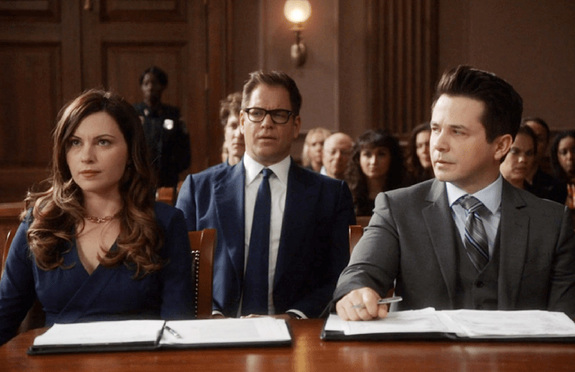Shadow Juries Are Priceless, But Don't Expect TV Land Biometrics
Shadow juries are excellent tools, and I'm a huge proponent of them. But if you decide to use one in your next trial, please don't expect biometrics or NSA-level technology.
January 17, 2019 at 06:17 PM
7 minute read

In this week's episode of “Bull,” we spend more time on Dr. Jason Bull's personal life than on his role as a jury guru. I get it; The public wants to see relatable stories, but, dang, it makes critiquing the authenticity of the show tricky. But here goes.
First, the episode has two plots. The first surrounds a millennial couple who recently eloped in Thailand. On their flight home, the young woman receives a call from her forgetful boss who's forgotten the combination to the business' safe (the business, by the way, is a jewelry company). In her infinite wisdom she provides the safe numbers verbally while in her seat waiting for takeoff. Note: because they were traveling in economy class, they had seatmates. At some point, she and her seatmate have a brief but friendly discussion about her job and recent nuptials. A few days later, she and her husband are arrested for armed robbery.
Enter, Bull.
No Pretrial Benders, Please
This week, Bull's romantic rival, Diana, asks Bull for help defending her niece in the armed robbery defense. He volunteers Benny to provide legal counsel for the newlywed's husband, and requests a joint trial (hence the episode's title, “Separate Together”). Even though Benny is trial counsel, Bull is once again front and center. Naturally.
After deciding to work together, Bull and Diana make what I consider a rookie mistake: they decide it's a great idea to go dancing, drink some shots, and have some fun the night before Opening.
To state the obvious, it's probably not the best idea to go in full-on party mode the night before trial begins. Maybe I'm just a curmudgeon, but I prefer to walk into the courtroom with a decent night's sleep, some food in my belly, and no hangover. But I'm not an attorney, so perhaps y'all have more superpowers? Trial is taxing enough in a perfect world; why make it even harder? But I digress.
The rest of the episode is just plain “meh.” So instead of grasping at straws, let's talk about something we see glimpses of in almost every “Bull” episode, including this one: the mysterious shadow jury. Sometimes called a mirror jury or jury observers, they're often used in high-stakes trials. But the ones depicted in “Bull” are ridiculously far-fetched.
Shadow Juries
If you believe what you see on TV, a shadow jury is a group of people who are physical and demographical doppelgängers for each of the empaneled jurors. These doppeljurors—along with actual jurors—are somehow connected to biometrics that measure how they will ultimately vote. And if you buy into the Hollywood hype, running commentary about who's voting how is surreptitiously shared with the jury consultant sitting in the courtroom using a Bluetooth earpiece. Sign. Me. Up.
But, alas, as we know all too well, real life is vastly different than Hollywood productions. Here's how it really works:
Follow Your Shadow
A shadow jury is meant to guide the trial team in its daily strategic decisions. Yes, you can focus strictly on the “vote,” but why would you do that? You have a group of people readily available to help gauge if you are on the right track or going off the reservation. Do they like your case as much as you do? Your witnesses? Your trial themes? Do they understand what you're trying to communicate or are they so overwhelmed with the complexity or the amount of information that they've shut down and are counting ceiling tiles or commenting on counsel's shoes?
A shadow jury helps answer these questions: What is today's takeaway? What did they miss? What questions do we need to answer? It is, perhaps, the absolute best way to get a real-time read on how the trial team is doing, both big picture and little picture.
Selecting Shadow Jurors
In the real world of litigation, a shadow jury typically consists of four to seven people. Best efforts are made to hire shadow jurors with similar demographics, but that's an extremely challenging task considering the amount of time between swearing in the jury and opening statements. Having said that, if each and every juror on your panel is a millennial, you don't want your shadow jury to be solely comprised of baby boomers in their late 50s and 60s. Unlike in TV Land, it takes time and a lot of effort to find people who don't have conflicts, can attend a full day of court every day, all day for however many days or weeks, and—this one's important—is not a total wing nut.
Shadow jurors are recruited (or certainly should be) from the actual trial venue and are vetted with a screening process that will help eliminate those with conflicts, biases or attitudes that are strike-worthy. In an employment trial, for example, if you've managed to strike every juror who has ever been fired, it's best to avoid seating someone with a history of terminations. But again, best efforts. It's not nearly as perfect and precise as Dr. Bull makes it seem.
In the world of “Bull,” we know shadow jurors exist, but we never actually see them. Where on earth are they? I've trained my eyes to scour the gallery during courtroom scenes and I never see any faces that resemble the Wall of Jurors in Dr. Bull's permanent war room. I still can't figure out where these people are physically located. How do the shadows observe the trial proceedings? Court TV? (Is that even still a thing?) Secretly mounted video cameras and mics? I have no clue and it drives me crazy.
In the real world, shadow jurors attend the actual trial proceedings each and every day. They are, to the extent possible, required to follow the exact same rules as the empaneled jurors. They do not talk with each other about the case; they do not conduct internet research; they sit in the courtroom and hear the same evidence, view the same exhibits and experience the same courtroom drama as the actual jurors. But it's important to remember that the real jurors have a front-row seat; shadow jurors do not.
Digital vs. Analog Feedback
But how do counsel discover what the shadow jurors think? Do they rely on Dr. Bull's fancy biometrics that seem to indicate how a juror will vote? First, let me be crystal clear: Nothing can predict what a human being with do with 100 percent accuracy. (And if someone tells you they can, you might want to move along.) While there are hand-held dials that some use during mock jury research (or presidential debates), I've never seen them used with shadow jurors. (Plus, I'm not a huge fan, but more on that another day.)
In actuality, shadow jury feedback is discovered the old-fashioned way: one-on-one verbal conversation, with a bit of written feedback. Most shadow jurors are interviewed after court each day by someone on the consulting team. The interviews are private (so not to influence other jurors), and generally focus on debriefing jurors on the day's proceedings. Feedback is then shared with the trial team. Again, the old-fashioned way with a quick-and-dirty written summary, or with a verbal update.
Shadow juries are excellent tools, and I'm a huge proponent of them. But if you decide to use one in your next trial, please don't expect biometrics or NSA-level technology. That stuff is shiny and makes for great TV, but when it comes to getting the most out of your shadow jury, nothing beats a face-to-face conversation when seeking a reality check.
Kacy Miller, president of CourtroomLogic Consulting LLC, will provide weekly reviews of new episodes of CBS' “Bull,” about an elite trial consulting firm. Miller began her career as a litigation consultant working alongside Dr. Phil McGraw, the inspiration for “Bull.” She can be reached at [email protected].
This content has been archived. It is available through our partners, LexisNexis® and Bloomberg Law.
To view this content, please continue to their sites.
Not a Lexis Subscriber?
Subscribe Now
Not a Bloomberg Law Subscriber?
Subscribe Now
NOT FOR REPRINT
© 2025 ALM Global, LLC, All Rights Reserved. Request academic re-use from www.copyright.com. All other uses, submit a request to [email protected]. For more information visit Asset & Logo Licensing.
You Might Like
View All
From Hospital Bed to Legal Insights: Lessons in Life, Law, and Lawyering
6 minute read

Nondisparagement Clauses in Divorce: Balancing Family Harmony and Free Speech
6 minute readTrending Stories
Who Got The Work
J. Brugh Lower of Gibbons has entered an appearance for industrial equipment supplier Devco Corporation in a pending trademark infringement lawsuit. The suit, accusing the defendant of selling knock-off Graco products, was filed Dec. 18 in New Jersey District Court by Rivkin Radler on behalf of Graco Inc. and Graco Minnesota. The case, assigned to U.S. District Judge Zahid N. Quraishi, is 3:24-cv-11294, Graco Inc. et al v. Devco Corporation.
Who Got The Work
Rebecca Maller-Stein and Kent A. Yalowitz of Arnold & Porter Kaye Scholer have entered their appearances for Hanaco Venture Capital and its executives, Lior Prosor and David Frankel, in a pending securities lawsuit. The action, filed on Dec. 24 in New York Southern District Court by Zell, Aron & Co. on behalf of Goldeneye Advisors, accuses the defendants of negligently and fraudulently managing the plaintiff's $1 million investment. The case, assigned to U.S. District Judge Vernon S. Broderick, is 1:24-cv-09918, Goldeneye Advisors, LLC v. Hanaco Venture Capital, Ltd. et al.
Who Got The Work
Attorneys from A&O Shearman has stepped in as defense counsel for Toronto-Dominion Bank and other defendants in a pending securities class action. The suit, filed Dec. 11 in New York Southern District Court by Bleichmar Fonti & Auld, accuses the defendants of concealing the bank's 'pervasive' deficiencies in regards to its compliance with the Bank Secrecy Act and the quality of its anti-money laundering controls. The case, assigned to U.S. District Judge Arun Subramanian, is 1:24-cv-09445, Gonzalez v. The Toronto-Dominion Bank et al.
Who Got The Work
Crown Castle International, a Pennsylvania company providing shared communications infrastructure, has turned to Luke D. Wolf of Gordon Rees Scully Mansukhani to fend off a pending breach-of-contract lawsuit. The court action, filed Nov. 25 in Michigan Eastern District Court by Hooper Hathaway PC on behalf of The Town Residences LLC, accuses Crown Castle of failing to transfer approximately $30,000 in utility payments from T-Mobile in breach of a roof-top lease and assignment agreement. The case, assigned to U.S. District Judge Susan K. Declercq, is 2:24-cv-13131, The Town Residences LLC v. T-Mobile US, Inc. et al.
Who Got The Work
Wilfred P. Coronato and Daniel M. Schwartz of McCarter & English have stepped in as defense counsel to Electrolux Home Products Inc. in a pending product liability lawsuit. The court action, filed Nov. 26 in New York Eastern District Court by Poulos Lopiccolo PC and Nagel Rice LLP on behalf of David Stern, alleges that the defendant's refrigerators’ drawers and shelving repeatedly break and fall apart within months after purchase. The case, assigned to U.S. District Judge Joan M. Azrack, is 2:24-cv-08204, Stern v. Electrolux Home Products, Inc.
Featured Firms
Law Offices of Gary Martin Hays & Associates, P.C.
(470) 294-1674
Law Offices of Mark E. Salomone
(857) 444-6468
Smith & Hassler
(713) 739-1250







